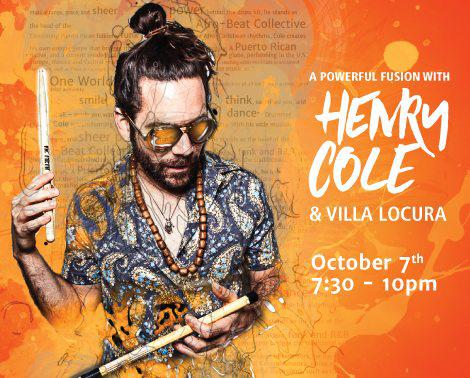
- On September 13, 2016
- In Culture
Language into a Beat: An Interview with Henry Cole
We’re excited to host this world renowned percussionist who is transforming the music scene: Henry Cole, a Puerto Rican native, alongside the Villa Locura, combines a variety of musical styles to create an entirely unique genre. His fusion of beats - from salsa, to folklore, to funk, to R&B, to jazz, to Afro-Caribbean rhythms - moves audiences to feel and dance across the globe; and when he isn’t making music, he teaches musicians in acclaimed classrooms like those of Carnegie Hall and Lincoln Center.
Though he’s been named “the future of drumming,” Cole remains humble in his successes. His polite, cool, and unwavering attitude has earned him the respect of not only world musicians and audiences everywhere, but also, ours. We had the pleasure of speaking with Cole to learn more about his passion for the drums, the evolution of his music, and his hopes for the future of music.
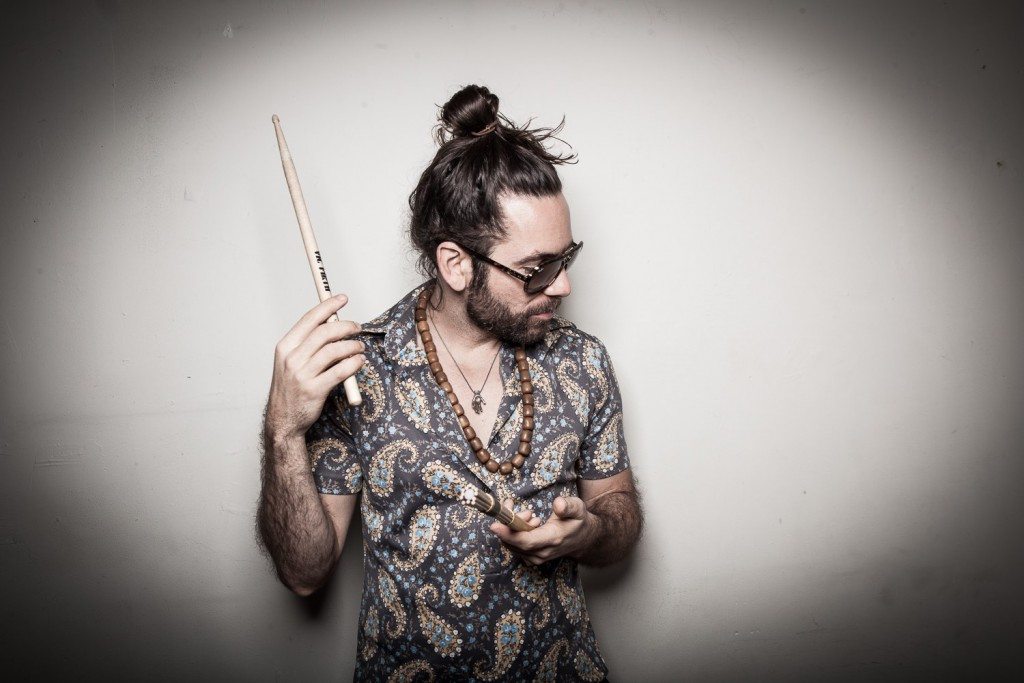 Can you tell us a story of your favorite memory or a moment that made you say, “Wow. I want to do this forever. I want to be a musician.”
I started playing the piano when I was 4 during school because my grandmother and my father were pianists, but when I was nine, I remember listening to the Rocky Balboa soundtrack and they feature this song, “Eye of the Tiger,” - that was the first time I fell in love with the drum set. I took that record to my neighbor and I remember she said, “Okay, that’s cool but listen to this -” and she played me a record by Striper, a heavy metal group. I remember the drums were louder and heavier, so back then I wanted to be a rock drummer. Then, I decided to enroll in the music school in Puerto Rico and even though there wasn’t a drum set, my teacher, a trumpet player, taught me how to read music, how to practice, and eventually when I was 15 I got my first drums and started playing every genre that I could. But that’s basically how it all started.
You’ve studied jazz in Boston, San Juan, and New York City - how would you say these places have influenced your musical styles?
I think the core of my musical style comes from being in Puerto Rico. PR is a very multicultural place to be, and as a musician if you want to make a living then you have to be good at playing many different styles. So I say that our country (PR) is a more musical environment because we have all of these different influences - Spanish, African, American, etc - so as a drummer, I grew up with many different styles.
In Boston and New York, I got more into jazz, but I saw there that everything was more separate. People were very good, but they only focused on one style. It was hard to navigate from one scene to the other, but eventually, I learned how to link every style. Music became a universal thing for me.
Can you tell us a story of your favorite memory or a moment that made you say, “Wow. I want to do this forever. I want to be a musician.”
I started playing the piano when I was 4 during school because my grandmother and my father were pianists, but when I was nine, I remember listening to the Rocky Balboa soundtrack and they feature this song, “Eye of the Tiger,” - that was the first time I fell in love with the drum set. I took that record to my neighbor and I remember she said, “Okay, that’s cool but listen to this -” and she played me a record by Striper, a heavy metal group. I remember the drums were louder and heavier, so back then I wanted to be a rock drummer. Then, I decided to enroll in the music school in Puerto Rico and even though there wasn’t a drum set, my teacher, a trumpet player, taught me how to read music, how to practice, and eventually when I was 15 I got my first drums and started playing every genre that I could. But that’s basically how it all started.
You’ve studied jazz in Boston, San Juan, and New York City - how would you say these places have influenced your musical styles?
I think the core of my musical style comes from being in Puerto Rico. PR is a very multicultural place to be, and as a musician if you want to make a living then you have to be good at playing many different styles. So I say that our country (PR) is a more musical environment because we have all of these different influences - Spanish, African, American, etc - so as a drummer, I grew up with many different styles.
In Boston and New York, I got more into jazz, but I saw there that everything was more separate. People were very good, but they only focused on one style. It was hard to navigate from one scene to the other, but eventually, I learned how to link every style. Music became a universal thing for me.
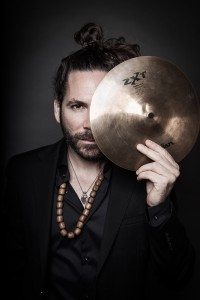 You’re described as “bringing the stylized traditions of Puerto Rico and Afro-Beat together to make something entirely new,” would you say you set out with this goal in mind or it just kind of happened?
When I listened to Fela Kuti it turned things around for me, what he did was exactly the same [as what I want to do]. He was using jazz, rock, yoruba, folklore and African to influence his music, plus he had the content and activism. So in my experience, I grew up playing rock and then I was a jazz drummer and then I learned a lot of folklore so it was kind of the same elements to me. He helped me see it was possible to blend everything.
I didn’t want to just play to the jazz audiences, I wanted to play to the people to have fun.
I wanted to be everywhere so I brought all of this music into my one band.
And I make people dance. [Laughs].
What’s the experience you’ve had with the Villa Locura (previously known as the Afrobeat Collective)? How did you come about playing with them?
When I moved to New York I would go back to Puerto Rico every Christmas, and I would want to sit in with all the bands I used to play with - the salsa guys, with the jazz people, etc - and the first few years were good but after a while it got kind of awkward. So that’s when I decided to form my own band to be able to continue having the same fun I was having when I played with many different bands.
My band became my vehicle for expression; it’s like my family. I choose the musicians because I like the way they play, but I also like that it brings us together.
[And] Villa Locura is the name of the neighborhood I grew up in. Originally, I called my band the Afro-Beat Collective, but too many people saw it just as a style. You see, Afrobeat is a way of playing, it’s not a pattern. It [afrobeat] allows me to orchestrate one language into a beat on the drumset; but people didn’t understand this and they expected my band to play African music. So the name Villa Locura gives me the freedom just to play music without the stamp of my music seeming to be African.
What was it like working with some of the world’s most acclaimed jazz groups, like the Grammy-nominated Miguel Zenon Quartet and Grammy winner David Sanchez? How have they influenced your work?
They’re my family - David is one of my mentors, and Miguel also, but I learn from everyone. You learn how they communicate, you learn the language of their particular way of thinking. It’s great to learn that from some of the best in the world. You work with all [kinds of] musicians, and you learn how they communicate and they think. The same thing with producers, you learn how they think and how they see music. They see it in a very different way than I see it, so then you learn from everyone and you blend them into your own way. It’s an experience that goes beyond anything, it’s cool.
You’re not only a successful musician, but also a highly sought-after educator; so, what advice do you have for the various artists and musicians of the Boston community?
You’re described as “bringing the stylized traditions of Puerto Rico and Afro-Beat together to make something entirely new,” would you say you set out with this goal in mind or it just kind of happened?
When I listened to Fela Kuti it turned things around for me, what he did was exactly the same [as what I want to do]. He was using jazz, rock, yoruba, folklore and African to influence his music, plus he had the content and activism. So in my experience, I grew up playing rock and then I was a jazz drummer and then I learned a lot of folklore so it was kind of the same elements to me. He helped me see it was possible to blend everything.
I didn’t want to just play to the jazz audiences, I wanted to play to the people to have fun.
I wanted to be everywhere so I brought all of this music into my one band.
And I make people dance. [Laughs].
What’s the experience you’ve had with the Villa Locura (previously known as the Afrobeat Collective)? How did you come about playing with them?
When I moved to New York I would go back to Puerto Rico every Christmas, and I would want to sit in with all the bands I used to play with - the salsa guys, with the jazz people, etc - and the first few years were good but after a while it got kind of awkward. So that’s when I decided to form my own band to be able to continue having the same fun I was having when I played with many different bands.
My band became my vehicle for expression; it’s like my family. I choose the musicians because I like the way they play, but I also like that it brings us together.
[And] Villa Locura is the name of the neighborhood I grew up in. Originally, I called my band the Afro-Beat Collective, but too many people saw it just as a style. You see, Afrobeat is a way of playing, it’s not a pattern. It [afrobeat] allows me to orchestrate one language into a beat on the drumset; but people didn’t understand this and they expected my band to play African music. So the name Villa Locura gives me the freedom just to play music without the stamp of my music seeming to be African.
What was it like working with some of the world’s most acclaimed jazz groups, like the Grammy-nominated Miguel Zenon Quartet and Grammy winner David Sanchez? How have they influenced your work?
They’re my family - David is one of my mentors, and Miguel also, but I learn from everyone. You learn how they communicate, you learn the language of their particular way of thinking. It’s great to learn that from some of the best in the world. You work with all [kinds of] musicians, and you learn how they communicate and they think. The same thing with producers, you learn how they think and how they see music. They see it in a very different way than I see it, so then you learn from everyone and you blend them into your own way. It’s an experience that goes beyond anything, it’s cool.
You’re not only a successful musician, but also a highly sought-after educator; so, what advice do you have for the various artists and musicians of the Boston community?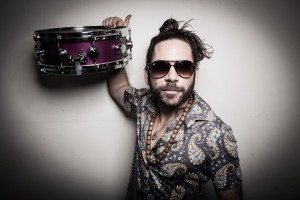 Musicians nowadays need to find that mentorship from the older generations. They need to be rooted in the dance tradition as well as in the school tradition. It’s a very fine balance because it’s very safe to be in the practice room and be in school, but when you’re out in the street it’s a different story. But then, I always encourage people when they’re the opposite - always out in the street - to spend time practicing by books and a metronome. It’s not one thing or the other, it’s a balance between the two.
We live in a very safe era, and we need to take risks.
I can tell you by experience with the record I’m doing now, it’s been all about taking risks and the doors open. Let’s say I want to work with an engineer who charges $20 grand to mix an album, but when they see a guy who has no money but is willing to take a risk, he’s done his homework - people relate to that because not a lot of people are doing it. Everybody wants to be safe. So it opens your doors, and then the engineer decides to work for less because they want to support that and that’s cool. Musicians are very shy but they need to go out and expose themselves to some kind of danger, [they need] to feel ‘unsafe.’
You’ve toured throughout the U.S. and Europe, Mexico and Central America, Korea and Japan. How has your music been received by these audiences? What kind of audiences does your ‘new style’ attract?
Very different always, the crowds are very different everywhere, but one thing is the same - the crowd always reacts to emotions. When they hear something different, they’re very emotional, happier... When you see a band that plays from the heart, it’s different, people feel it right away and they react. I think that’s the key. Transmitting a message - hope, faith, love, or whatever - not for yourself, just going outside the words.
Musicians nowadays need to find that mentorship from the older generations. They need to be rooted in the dance tradition as well as in the school tradition. It’s a very fine balance because it’s very safe to be in the practice room and be in school, but when you’re out in the street it’s a different story. But then, I always encourage people when they’re the opposite - always out in the street - to spend time practicing by books and a metronome. It’s not one thing or the other, it’s a balance between the two.
We live in a very safe era, and we need to take risks.
I can tell you by experience with the record I’m doing now, it’s been all about taking risks and the doors open. Let’s say I want to work with an engineer who charges $20 grand to mix an album, but when they see a guy who has no money but is willing to take a risk, he’s done his homework - people relate to that because not a lot of people are doing it. Everybody wants to be safe. So it opens your doors, and then the engineer decides to work for less because they want to support that and that’s cool. Musicians are very shy but they need to go out and expose themselves to some kind of danger, [they need] to feel ‘unsafe.’
You’ve toured throughout the U.S. and Europe, Mexico and Central America, Korea and Japan. How has your music been received by these audiences? What kind of audiences does your ‘new style’ attract?
Very different always, the crowds are very different everywhere, but one thing is the same - the crowd always reacts to emotions. When they hear something different, they’re very emotional, happier... When you see a band that plays from the heart, it’s different, people feel it right away and they react. I think that’s the key. Transmitting a message - hope, faith, love, or whatever - not for yourself, just going outside the words.
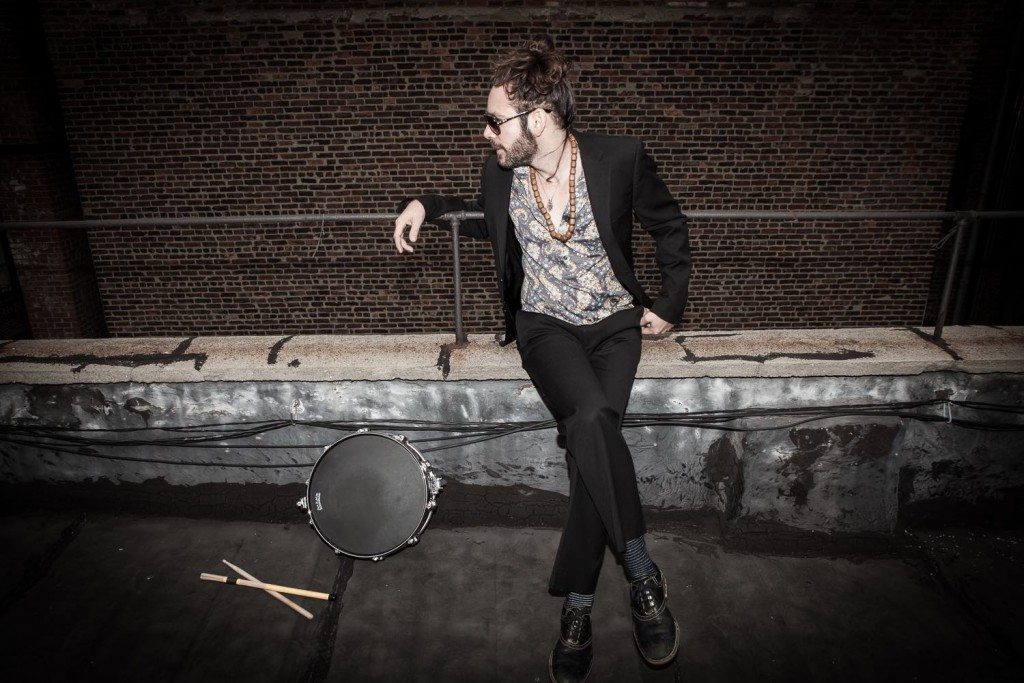 Lastly, we wanted to know your thoughts regarding IBA’s mission to promote Latino culture through the arts. How important do you think this is in Boston and other cities across the United States?
I think it’s really important, and the community is great. What this group does takes a lot of effort and a lot of faith everyday, but I’m happy that there’s people willing to do it, and it makes a difference for all. It takes time for the rest of the world to see the results, but little by little it’s working great. There should be more of that. I always tell people running these organizations, when times are difficult just keep going, stay with it and stay strong. It’s because of them we [musicians] have gigs and people have concerts to go to. I tell them to stay strong because I know it’s hard, but it’s a domino effect - if they stay strong then we [musicians] are strong too because we have places to play and it helps everyone.
You won’t want to miss this world class musician whose beats are transforming the music scene. Let a Powerful Fusion with Henry Cole & the Villa Locura move you at Villa Victoria Center for the Arts on October 7th at 7pm. You can purchase tickets online now....
Lastly, we wanted to know your thoughts regarding IBA’s mission to promote Latino culture through the arts. How important do you think this is in Boston and other cities across the United States?
I think it’s really important, and the community is great. What this group does takes a lot of effort and a lot of faith everyday, but I’m happy that there’s people willing to do it, and it makes a difference for all. It takes time for the rest of the world to see the results, but little by little it’s working great. There should be more of that. I always tell people running these organizations, when times are difficult just keep going, stay with it and stay strong. It’s because of them we [musicians] have gigs and people have concerts to go to. I tell them to stay strong because I know it’s hard, but it’s a domino effect - if they stay strong then we [musicians] are strong too because we have places to play and it helps everyone.
You won’t want to miss this world class musician whose beats are transforming the music scene. Let a Powerful Fusion with Henry Cole & the Villa Locura move you at Villa Victoria Center for the Arts on October 7th at 7pm. You can purchase tickets online now....
